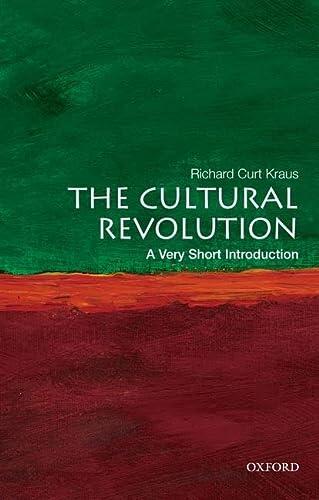
The Cultural Revolution: A Very Short Introduction
No ratings yet
Format
Paperback
Pages
138
Language
English
Published
Jan 17, 2012
Publisher
Oxford University Press
ISBN-10
0199740550
ISBN-13
9780199740550
Description
In a sweeping exploration of one of the most tumultuous periods in Chinese history, Richard Curt Kraus delves into the complex dynamics of the Cultural Revolution. Spanning a decade, this era was marked by fervent ideological purges and transformative societal change that would not only reshape China but reverberate across the globe. Kraus unravels the motivations behind the movement, examining how a blend of political ambition and cultural fervor led to widespread upheaval.
The narrative presents the cultural landscape of China during this period, illustrating how traditional values clashed with radical ideologies. Kraus skillfully navigates through the intricate web of societal impacts, shedding light on the experiences of ordinary citizens whose lives were profoundly altered. The author’s insights reveal the depth of emotional and psychological turmoil faced by individuals caught in the crossfire of political fervor.
Moreover, Kraus contextualizes the Cultural Revolution within the broader spectrum of Chinese politics, highlighting its implications for future governance and societal norms. The transformation undertaken during this period was not merely a domestic affair; it had implications that extended to international relations, altering how countries viewed China amidst the waves of global change.
By weaving together historical analysis and personal reflections, Kraus provides readers with a succinct yet profound understanding of this pivotal chapter in China’s narrative. Through this examination, readers gain a deeper appreciation of how the Cultural Revolution left an indelible mark on both Chinese society and the world at large.
The narrative presents the cultural landscape of China during this period, illustrating how traditional values clashed with radical ideologies. Kraus skillfully navigates through the intricate web of societal impacts, shedding light on the experiences of ordinary citizens whose lives were profoundly altered. The author’s insights reveal the depth of emotional and psychological turmoil faced by individuals caught in the crossfire of political fervor.
Moreover, Kraus contextualizes the Cultural Revolution within the broader spectrum of Chinese politics, highlighting its implications for future governance and societal norms. The transformation undertaken during this period was not merely a domestic affair; it had implications that extended to international relations, altering how countries viewed China amidst the waves of global change.
By weaving together historical analysis and personal reflections, Kraus provides readers with a succinct yet profound understanding of this pivotal chapter in China’s narrative. Through this examination, readers gain a deeper appreciation of how the Cultural Revolution left an indelible mark on both Chinese society and the world at large.
Reviews
Reading Log
No reading logs found
Start tracking your reading progress to see logs here
Add Your First Reading LogNotes
Transaction Log
No transaction logs found
Start tracking your book transactions to see logs here
Add Your First Transaction Log